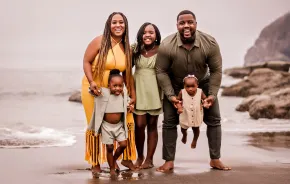
Washington State University quarterback Tyler Hilinski was found dead by suicide yesterday at 21 years old. It's tempting to say he had everything to live for and objectively he did: He was young, talented and on his way to a starting position with his team. But depression doesn't care about your potential.
I didn't know Hilinski, but I still I cried when I read the news. I cried for a young life lost, but I also cried for my own son. He's battled depression and suicidal thoughts since he was 13. He's 17 now, and I like to think that he's made progress. But every man who loses his fight with mental illness brings my own son one step closer to suicide — or at least that's what my fear tells me.
Depression doesn't care about your potential.
I see my son in Hilinski in other ways. His coaching staff and friends described him as outgoing and social. No one knew, it seems, that he was battling demons. No one knew my son was, either. The difference is that my son eventually told his friends about his suicidal thoughts and I was able to get him help.
It's easy to imagine why it was harder for Hilinski to open up. As a football player, he's expected to be tough. And often, toughness for a boy is equated with silence. For all of the support and camaraderie of a football team, it isn't where boys go to share their struggles with mental illness.
I wish I could tell Hilinski that it's okay to be vulnerable — and that vulnerability is a manifestation of strength. But even if he were still alive, there are some things boys need to hear from men. They need to see men they respect and admire speak openly about mental health, depression and suicide. They need to know they aren't the only ones hurting, and they need to know there's a way out that doesn't end in a morgue.
My son has long been open about his struggles. When I first wrote about his suicidal thoughts, I did so anonymously. He told me to use my name next time; it was important to him that we all be open about mental health and to fight back against the stigma however we could.
Toughness for a boy is often equated with silence.
A few days ago, my son told me that he hates hearing people tell him "it gets better." "How do they know that?" he asked me. "Maybe it won't." It struck me that he needs to hear from men who have lived through it and seen the other side. He needs to see men battling depression and suicidal thoughts, who don't end up a suicide statistic; he needs to see male survivors so he can see himself as a survivor.
Suicide is the 10th leading cause of death in the U.S. But white men accounted for seven out of 10 of those deaths in 2016, and middle-aged men comprised the majority. When my son tells me it may not get better, statistics suggest he's right. My son knows the statistics, but I want him to know there's still hope.
After Hilinski's death, many men shared exactly that. They talked about mental health and vulnerability, and they pushed back against the toxic notion that silence is strength.
This Tyler Hilinski news is hard. We all need to talk more about depression. Here's a start: I've battled depression for most of my life. I spent my 20th birthday in the hospital b/c of it. I'm here now b/c I finally talked to people about it. I wasn't alone. You're not alone.
— Zack Rosenblatt (@ZackBlatt) January 17, 2018
Male suicide is the biggest killer of men under 50. It is preventable.
— Matt Haig (@matthaig1) January 16, 2018
Let's not man up. Let's not tough it out.
Let's find true strength instead. Let's show our vulnerability. Let's stop faking macho bullshit. Let's change.
Waking up to the awful Tyler Hilinski news. One of the things we can all do to honor his memory and save more lives is to break down the stigma around mental health. There is still a long way to go. Just because you can’t see it, doesn’t mean it’s not there. pic.twitter.com/GKurM3C6ow
— Darren Rovell (@darrenrovell) January 17, 2018
Sharing these stories won't bring Hilinski back. But they have power — the power to show another boy that he isn't alone. That there is hope. And that other men have fought the same battle and survived.
If you or someone you know needs help, call the National Suicide Prevention Lifeline at 1-800-273-8255.











